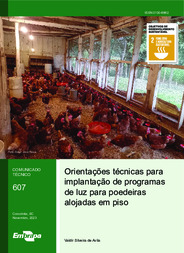
Photo: BASSI, Levino
The Embrapa 051 free-range laying hens are hybrid chickens, resulting from crossing the breeds Rhode Island Red with white Plymouth Rock, and selected by Embrapa Swine and Poultry. Such hens specialize in brown shell table egg production and, because they are rustic, adapt well to less intensive systems. They have deep brown plumage, and excellent egg production, longevity and rusticity. They start laying eggs at 20 weeks of age and have a yield potential of 345 eggs per housed hen, up until the age of 90 weeks. The production peak of 90% is reached at 29-30 weeks and the egg weight is above 56g. At the end of the production period, the hen has an average body weight of around 2.385 kg, which allows use for meat consumption. To achieve the proposed production targets, the hens have to have suitable health management, feeding, equipment and lighting, as required for chickens of other commercial lines of brown eggs. With the development of the Embrapa 051 Free-range Laying Hens, family-based smallholders have the chance of working with more advanced genetics, which increase egg laying productivity and add value as carcasses can be sold for consumption. Who benefits from it The main beneficiaries of the technology are family farmers from all over Brazil. Economic and social benefits Higher egg productivity and improved feed conversion per dozens of eggs produced, in addition to increased income in the property and higher health standard for the broodstock due to the origin of the chicks. The technology has a positive social impact with benefits in income generation, food security and the management and administration of rural establishments. It is also presented as an important alternative to traditional crops and farm animals such as tobacco, swine, and broiler chicken, and traditional annual crops, especially for family farmers excluded from integrated and cooperative systems. Consumers benefit from the possible impacts in food security in view of the synergistic effect between the technological increment and higher managerial and technical efficiency in the agricultural establishment. For exporting agribusiness, such effects also improve the management of such marginal livestock, which can represent a potential risk to the international recognition of the Brazilian animal health status.







